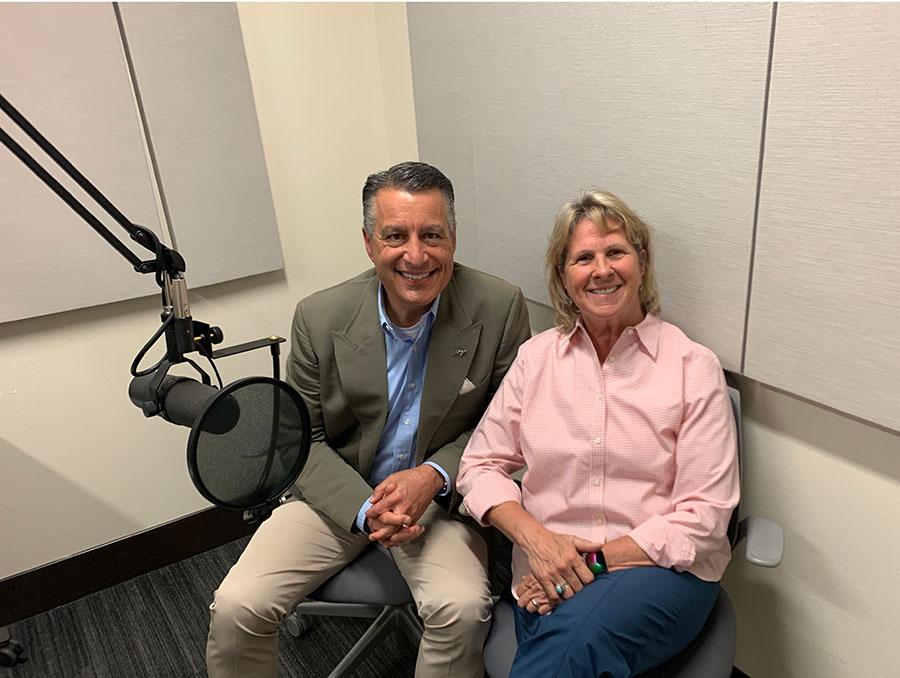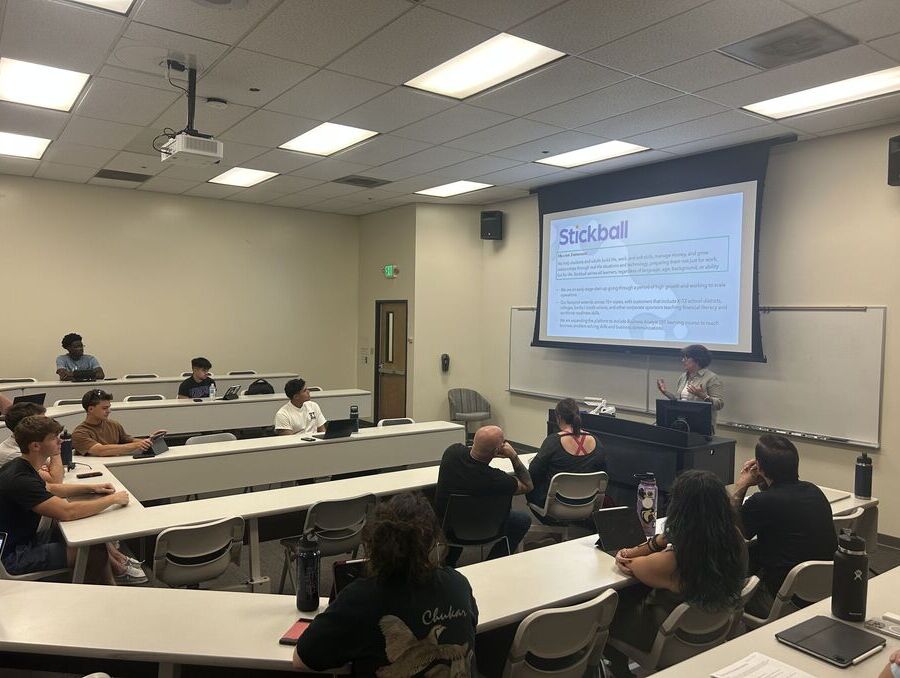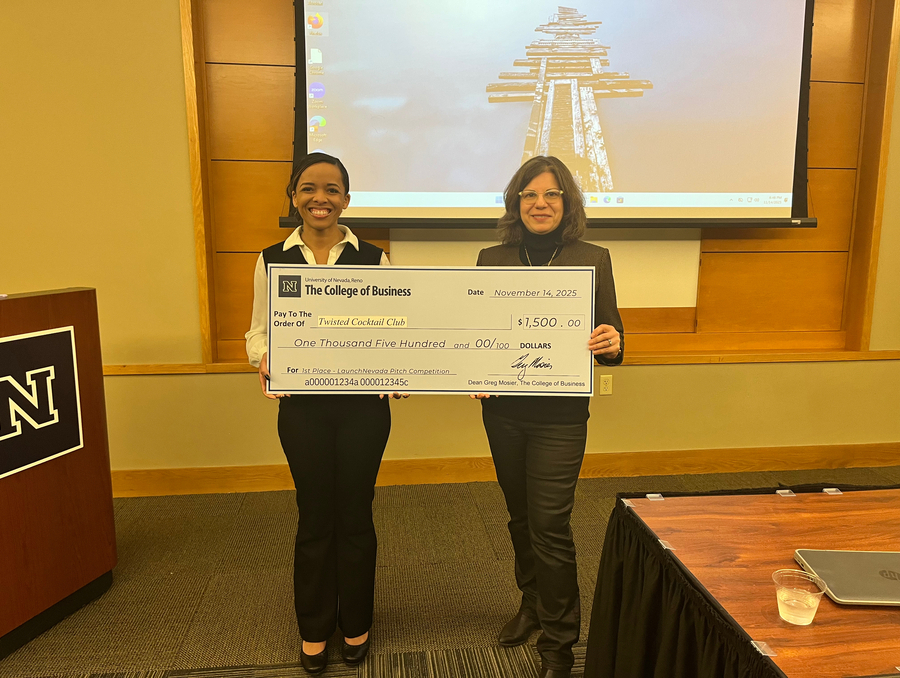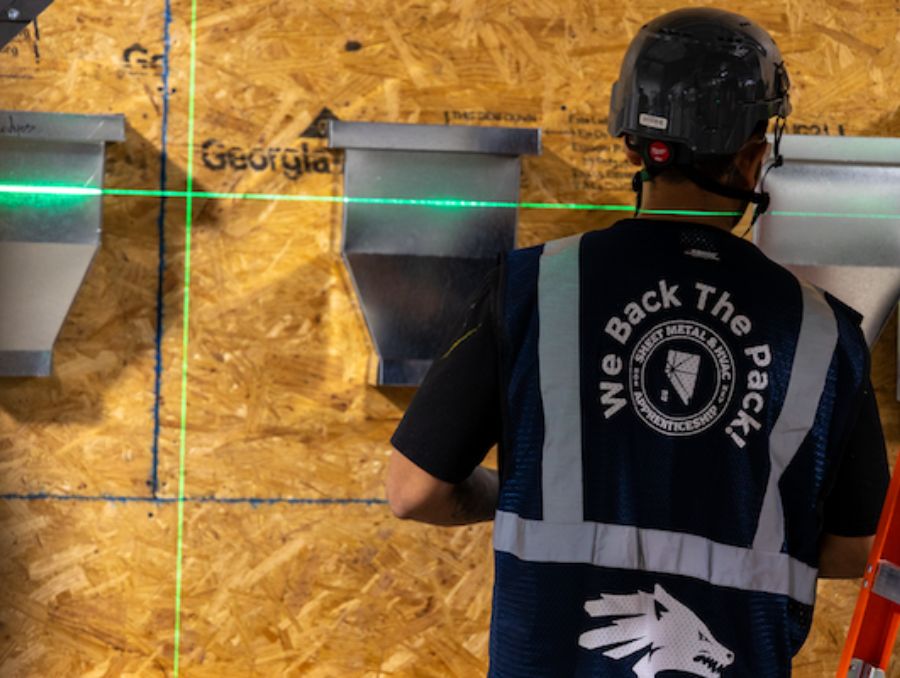
In Sagebrushers season 2 episode 7, University of Nevada, Reno President Brian Sandoval interviews Cary Groth, the director of the Sports Management programs within the College of Business. Groth is a highly accomplished athletics administrator with over 40 years of experience in intercollegiate athletics and the founder of the PICTOR Group.
During the episode, Sandoval and Groth explore the evolution of the Sports Management programs, which include a sports management minor at the undergraduate level and an executive certificate at the graduate level. Groth also discusses the role of the Sports Management Executive Board, with industry leaders from every intercollegiate and professional sports organization within the state of Nevada and national sports leaders in intercollegiate and professional sports.
They also chat about the Lake Tahoe Sports Summit held in May 2023 with guest speakers Emily Prazer, chief operating officer of the Formula 1 Las Vegas Grand Prix, and Lauralyn Sandoval, first lady of the University and vice president of new markets for Aristocrat Technologies. Those interested in participating in the sports management minor or executive certificate can learn more on the Sports Management programs website.
Sagebrushers is available on Spotify, Apple Podcasts and other major podcast platforms, with new episodes monthly.
Sagebrushers – S2 Ep. 7 – Director of the Sports Management Programs Cary Groth
Join host President Brian Sandoval as he and Director of the Sports Management Programs Cary Groth discuss sports management education at the University, the role of the Sports Management Executive Board, the Lake Tahoe Sports Summit and more.
Cary Groth: So, every one of our professional sport entities in the state of Nevada are represented and not just by somebody within the organization but by somebody like the CEOs or the presidents, COOs. They've all said yes. So, what we tried to do is get our whole state involved to offer the best sports management graduate program in the state.
President Brian Sandoval: In this episode of Sagebrushers, we welcome Cary Groth, director of the College of Business Sports Management program at the University of Nevada Reno. I'm Brian Sandoval. I'm a proud graduate and president of the University, and I'm your host of Sagebrushers.
Cary is a highly accomplished athletics administrator with more than 40 years of experience in intercollegiate athletics. She served as the athletics director at two NCAA Division I FBS institutions, Northern Illinois University and our very own University of Nevada. She's also the founder of the PICTOR Group, which assists intercollegiate athletics programs, athletic conferences and sports organizations with financial planning, strategic thinking and more. Today's podcast is being recorded at the Reynolds School of Journalism on our University's campus. Cary, welcome to Sagebrushers. We're very, very happy to have you.
Groth: Good morning.
Sandoval: Good morning. So, you are back on campus after a brief retirement, and we're so glad you decided to return. What has your experience been like switching from the athletic to the academic side of the University?
Groth: Oh my, it's very different. I wish I had the experience before being athletics director. You could understand the, the academic side a little bit better, I think. But it's been very rewarding. I mean, working in the College of Business and the different professors, but particularly the dean, you just learn a whole other side of the institution and how it works. So, it's been very rewarding for me.
Sandoval: So, what is your role in the College of Business?
Groth: Oh boy! Well, you know, about four years ago, Dean Mosier and I – it was during COVID – talked about starting the Sports Management program, an undergraduate minor and then a graduate-level certificate program that was different than other programs around the country. And so, we've put that together and now it's, it's running, it's up and running. We're in the third year of the undergraduate minor and we're in our second, we're going into our third cohort for the graduate program. It's been fun.
Sandoval: So, let's, let's break that down a little bit for the two. So, let's talk about the graduate program.
Groth: Okay.
Sandoval: And what that is and kind of the profile the students that you have that have, are participated in the program.
Groth: So, the graduate program is an 11-hour curriculum. Nine of those are on Zoom. So, they're two, there are six hours in the fall, three hours in the spring. And they're, you know, students from all over the country can take this, this cohort and this program, because they're on Zoom, offered on Zoom.
Then two classes, two one-hour classes are in person. There's a one-hour internship class that the students do wherever they wanna do it, whether it's in the professional ranks or intercollegiate ranks or even high school. We had a young man that was working with one of our local high schools this year. And then we bring the students to Tahoe. That's the jewel of the program. They come in person, they go through nine academic cohorts, if you will, or modules. And then of course we started off with our wonderful opening dinner.
Sandoval: You know, and then let's talk about the sports management minor.
Groth: Okay
Sandoval: And I know it, it started out modestly, but it's, it's exploding.
Groth: Mm-hmm.
Groth: I know almost time to add a major, I tell the dean. The sports management minor is 18 hours. Nine hours are current College of Business classes, your accounting, your marketing and management. Then there's nine additional hours that are sports management focused and those are in person. We announced the sports management minor in November of 2020. It was right before Thanksgiving. Got back from Thanksgiving and all three classes were filled to capacity. And so that's at 40 per class now. We just expanded it for this fall to go to 70, and I think we're going to fill up. I mean, it's interesting. Kids like it.
Sandoval: No, they love it. And so, when you talk to the students and in both programs, is it their hope that they'll get a job with a professional sports franchise, become an athletic director like yourself, other pathways to get involved in sports?
Groth: I think so. And you know, sports is so dynamic and interesting to so many people. What we find in the minor is we have students that are in journalism that take the sports management minor and in education. So, they can add to. So if they're going into teaching, for example, and want to coach, this is going to help them along the way. So, of course they want to be in sports and they want to get that top job as soon as they graduate with their undergraduate. So, we're going to start an internship program with the undergraduate level minor next summer. You know, our athletic department really needs some help and it'd be great for our students to go over there and get experience working with Stephanie and her team.
Sandoval: Now, going back to the program, you have a kind of a star-studded board.
Groth: Mm-hmm.
Sandoval: And if, if there's a better board, I'd really like to see it.
Groth: It's a, a great board.
Sandoval: But will you talk a little bit about some of the entities and individuals that have stepped up to be a part of this program?
Groth: Well, it's quite fascinating and it's very rewarding. And, and actually I get a little star-studded fever when I'm around them because they're incredible. But they're just wonderful people that have volunteered to serve on the board to help provide us with content advice, if you will, and opportunities for the students to do their internships.
So, every one of our professional sport entities in the state of Nevada are represented and not just by somebody within the organization, but by somebody like the CEOs or the presidents, COOs. They've all said yes. We have our minor league programs throughout the state that are represented. And then we have our chambers, both chambers north and south.
And like our RSCVA, we have a similar organization down in Vegas. So, what we tried to do is get our whole state involved to offer the best sports management graduate program in the state. We're already starting to talk with the Oakland As to have them come on board as well as the Boxing Association. Stacy and I are going down to meet with them as well to get on the board.
Sandoval: The UFC, yeah?
Groth: Yeah, the UFC, thank you. I'm not that familiar but the UFC. And so, we wanted everyone represented and then we, we looked at the top athletic directors in the country and people with impeccable reputations, including our own Stephanie. So, we have four athletic directors representing different regions of the country that have come on the board as well. And so, and you know what, Brian, they stay through that summit, and they listen to these modules with the kids, and that's pretty rewarding.
Sandoval: So, I'll do some namechecking. But you have the Las Vegas Raiders.
Groth: Las Vegas Raiders.
Sandoval: The Vegas Golden Knights.
Groth: Yes, that are in the playoffs.
Sandoval: That are in the Stanley Cup finals.
Groth: In the finals, yep.
Sandoval: And you also have the Reno Aces.
Groth: Reno Aces.
Sandoval: Reno Aces as well. And.
Groth: Las Vegas Aces.
Sandoval: Las Vegas Aces
Groth: World champions.
Sandoval: Yes. WNBA.
Groth: Right.
Sandoval: So, they're represented as well. And Formula 1.
Groth: Formula 1, Emily's on the board.
Sandoval: Yeah. So, again, I challenge, you know, anyone to find a board that is better represented in like, as you say, potentially the, the UFC and you know, perhaps the, the soon-to-be Las Vegas As.
Groth: Right.
Sandoval: So it's, it's pretty incredible.
Groth: And if we get an NBA franchise, which is the hope in a couple years, bring them on board. And I think what we would like to do as we grow this program is maybe instead of one cohort of 15, that's a perfect number. Maybe we can offer two cohorts of 15. But right now, we're kind of stuck between nine and 13 students for the first two years. So, we've gotta continue to grow, get the word out about the program and get it filled.
Sandoval: No, and you, you, you talked a little bit about the certificate program.
Groth: Mm-hmm.
Sandoval: And the executive program, and it's online, and then the final part of it is up at Lake Tahoe.
Groth: Right.
Sandoval: Which I always say when Tahoe is in the sentence, the answer is yes.
Groth: Totally.
Sandoval: But we had a dinner and you had a pretty profound and exciting guest speaker. Do you want to talk about that?
Groth: Well, first it was after our first year of the program last year, we had two really dynamic speakers. We had President Sandoval interviewing Mark Badain, who, you know, the two, you included, brought the Raiders from Oakland to Vegas. And no one really gets to sit down and listen to that story. So, that was incredible. I remember walking away that evening going, how am I going to top this?
And we've equaled it by bringing in Emily Prazer, and then of course your wife did the interviewing and I think she's pretty much responsible for bringing Formula 1 to the state, which is incredible. And so, they offered a front door, if you will, front porch experience for our students and our community members and our board to hear about Formula 1. And it's pretty fascinating.
Sandoval: No, and you know, I was, happened to be present.
Groth: Mm-hmm.
Sandoval: And it was exciting to listen to Emily talk about the investment that they're making.
Groth: Right.
Sandoval: It's a half-billion-dollar investment in southern Nevada in the infrastructure.
Groth: It’s amazing.
Sandoval: And you know, I admittedly didn't know a lot about Formula 1, but it may be as popular, it may be the world's most popular sport. And they sponsor events from all over the world and now it's coming to Las Vegas for at least 10 years and…
Groth: It's more popular than the NFL. And I didn't know that either. I had to read a lot before I went to visit with her. And it's, you know, I was just telling the folks here that I just made a room reservation down in Vegas. It was pretty tough to find one, but some of the hotels are starting at $2,400 a night. So, it's pretty popular, I would say. I'm not buying one of those hotel rooms, by the way, but people love it, you know, and Netflix has really helped propel that, at least in the United States as well.
Sandoval: No, and I think you alluded to it, and I'm sure that's part of this program that we have on our campus, is the economic impact that these professional sports franchises and Formula One can have on a state's economy.
Groth: Right. Very much so. You know, I think Las Vegas is going to become the sports mecca of the world soon. And there's opportunities for the University of Nevada to take the program that we have today, the Sports Management Program, and offer international opportunities in the form of summits and bring them to Vegas and show what they're doing the state is doing from a professional sports and intercollegiate sports from the whole state perspective.
Sandoval: Yeah. And you know, I would say that Las Vegas is the sports capital of the world.
Groth: Yeah.
Sandoval: And you know, again, it's not for sure yet, but if the, the As are to come. And then as you mentioned, a potential NBA franchise and maybe a professional soccer franchise.
Groth: Yes. Very much.
Sandoval: Down the road. And Super Bowl is going to be in Las Vegas next year. And there are other events that are, that are coming up as well that Las Vegas has certainly become the place to host events. The Final four is coming to Las Vegas.
Groth: That’s right. Right, exactly. And, you know, going back to the board participation, the board is also one that they can collaborate on projects together too. You know, for the north and south and some of our national representatives to come up with some new ideas or collaborative ideas. Let me give you an example. Tim Cass, who is on our board, he's from the USTA, tennis association. So, he is currently working on trying to find a home for pickleball. So, they were looking in Orlando. I happened to be in the lobby at the hotel at the summit with Mary Beth Sewald from Vegas, from the Chamber. And I said, “Hold on a minute, Tim. Mary Beth is here, put them on the phone. And Tim and the consulting company is coming down to Vegas to look at land and to talk to people about bringing pickleball, one of the fastest-rising sports, to Vegas.” So that's another advantage of that board is working together to offer additional opportunities in this business.
Sandoval: So, let's go back to our, our students. Okay. And if I'm a prospective student, where do I go to look to sign up for a sports management minor or sign up for the executive program?
Groth: Well, you go to the website to unr.edu and then you go to the College of Business and Sports Management is prominently displayed within the website. But we also run a social media campaign from January through June. And that's where we've, we've got about six of our students from our social media campaign. And then it's, it's word of mouth, trying to get as much exposure as we can.
We have partnerships with the National Association of Collegiate Directors of Athletics. We have a partnership with WeCoach, which is the national coaching association that has over 8,000 members. We just partnered with them on a project. And then we have the National Association of Collegiate Women Athletic Administrators. So, we're trying to get out there as much as we can. This program is an off-state program, so there, there are no federal assistance or grants, scholarships for the students. It's out of pocket; it's $10,000. So, you know, they've got to be committed to the program to do this.
Sandoval: Yeah. We're almost out of time, but I have one more question. So, we'll put out Cary's crystal ball, where do you see this program in five years?
Groth: Boy, I see a couple cohorts, couple cohorts as we're doing now, but I also see some legs on it with some other opportunities in not only doing the summit in Tahoe but offering maybe a different type of international summit for international learning with our international friends in Las Vegas.
Sandoval: Well, thank you. And, unfortunately, that is all the time we have for this episode of Sagebrushers.
Groth: Went by fast.
Sandoval: Yes, it did. And Cary, thank you so much.
Groth: You’re welcome.
Sandoval: And so grateful for all the effort that you've put into this because it really is another shining jewel in the crown of the University of Nevada. And join us next time for another episode of Sagebrushers as we continue to tell the stories that make our University special and unique. Until then, I'm University President Brian Sandoval, and go Pack.
















